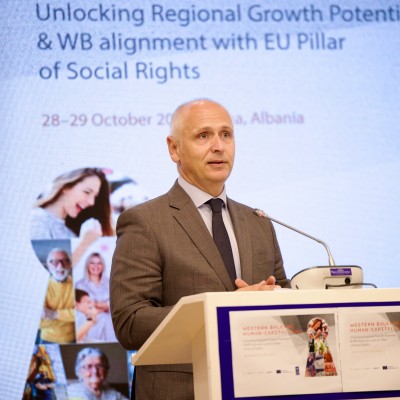ESAP 2: Undeclared work in the Western Balkans needs to be formalized, to increase both public revenues and social security
12 June 2020

Plenary meeting with Western Balkans officials from key institutions tackling undeclared work took place on 12 June 2020 in online format (Photo: RCC/Klicker Production)
Initiative for Regional Network for Tackling Undeclared Work presented and discussed at the RCC’s ESAP 2-hosted online plenary meeting with representatives of Western Balkans’ Ministries in charge of labour and social policies and enforcement authorities
Sarajevo – “The global pandemic caused by the COVID 19 virus has had a profound impact on businesses and workers, as well as economies across the Western Balkans. The undeclared workers, however, have been disproportionately affected since they generally work in low productivity jobs and have little to no savings, and are also mostly excluded from the government’s aid packages. This calls for stepping up of activities in tackling this widespread phenomenon across the region”, said Nand Shani, Team Leader of the Regional Cooperation Council’s (RCC) Employment and Social Affairs Platform project (ESAP2) addressing the participants of the online plenary meeting with Western Balkans officials from key institutions tackling undeclared work, that took place today.
During the pandemic lockdown, the Public Employment Services (PES) in the Western Balkans recorded the rise of unemployment. This phenomenon definitely affects undeclared work as well, which in the region is in the area between 18-30%. Findings of the RCC’s annual public and business survey, Balkan Barometer 2020 show that 81% of the Western Balkan businesses report negative effects of the coronavirus to their work. 2% of businesses have already had to close and 60% to downscale their operations. On tops of that 68% of the citizens are very much concerned about their jobs.
“We at the RCC’s ESAP 2 are committed to approaching this issue in a structured way, regionally, to preserve jobs and encourage incentives for the transition from undeclared to declared work. To that end, we plan to jointly tackle undeclared work, based on the successful European Platform Tackling Undeclared Work. Our regional Platform would, through close cooperation, sharing of experiences, good practices, and mutual learning, help institutions better understand what works and what not to incentivize the transition to formality”, added Shani further elaborating on plans and activities of the project in the region.
While explaining the scope and goal of the envisaged Western Balkans network, ESAP 2 Senior Expert on Undeclared Work, Prof. Collin Williams underlined the 2-folded benefit of such an approach: great opportunity to improve policies and enforcement practices through sharing of experiences and ideas; and helpful for alignment with European practices, required from the regional economies in their European integration endeavors.
“The point is not to eliminate undeclared work but to make it beneficial for them to declare their businesses, pay taxes, and social contributions. That way we have an increase in public revenues but also social security. So, via Platform, though cooperation, mutual learning, sharing and analyzing data, and joint action of policymakers, enforcement authorities as well as social partners, we can work towards the common goal of the greater transition of undeclared businesses to the formal sector.”
Bernd Wild from the European Commission’s Directorate-General for Employment commended the project, its initiatives, and plans, stressing the importance of close cooperation as well as public awareness and promotion of the activities, needed for achieving the set goals, and added the continued support of the European Commission.
The meeting titled “The coronavirus pandemic and undeclared work, in the framework of ESAP 2, gathered Ministries of Labour, Labour Inspections, Tax Authorities and Public Employment Services from the six Western Balkan economies. The participants presented the status and measures introduced during the pandemic, reflecting on the undeclared work in this specific period. Furthermore, they discussed recovery strategies and future plans on this front.



